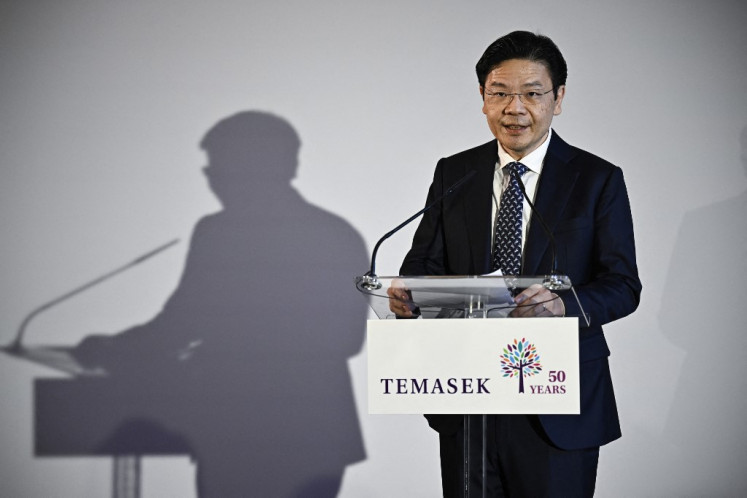Jokowi gets warm welcome from financial market
An increased appetite in the rupiah and local stocks was seen a day after president-elect Joko âJokowiâ Widodo was officially announced the winner of the recent presidential election, along with vice president-elect Jusuf Kalla
Change Size

A
n increased appetite in the rupiah and local stocks was seen a day after president-elect Joko 'Jokowi' Widodo was officially announced the winner of the recent presidential election, along with vice president-elect Jusuf Kalla.
The rupiah advanced to below the 11,500 per US dollar level for the first time in two months on Wednesday, according to prices from local banks compiled by Bloomberg. The currency ended up closing at 11,505 per dollar in the day's late trading session, or 0.9 percent stronger compared to a day earlier.
Foreign investors bought Rp 510 billion (US$44.3 million) more stocks than they sold on Wednesday, pushing up the benchmark stock index by 0.2 percent to close at 5,093.
International funds have bought Rp 12.5 trillion of Indonesian stocks throughout July, taking foreign inflows in the stock market up to an impressive Rp 56.6 trillion so far this year.
'Over the medium term, we think the perceived market-friendly leanings of the Jokowi-Kalla team should support the positive momentum in rupiah assets,' economists from UK-based Barclays Bank wrote in a note distributed to clients on Wednesday.
'In particular, if the new administration is able to implement its policy platforms on corruption and government efficiency, energy reforms and fuel subsidies, there could be significant improvement in the country's fiscal and current account health,' the bank stated.
Jokowi, aiming to grow Southeast Asia's largest economy by 7 percent, has stressed the importance of infrastructure development to bolster growth and cutting energy subsidies that have strained state finances.
Vigilant observers, however, have said that the positive sentiment may be fleeting as the country's economy is facing issues in the external account, and on presidential contender Prabowo Subianto's intention to contest the election result at the Constitutional Court.
Recent bullish sentiments in Indonesia's financial market may be short-lived, Finance Minister Chatib Basri told reporters on Wednesday.
'I welcome the fact that our elections could be held peacefully. After this, however, the issue will back to fundamentals,' he said at his office in Jakarta.
'Soon, we will face the hard truth that the global financial market remains volatile; that some geopolitical risks still prevail; that there is a small likelihood our economic growth could jump significantly next year,' the minister noted.
Bank Indonesia has estimated that the country's current-account deficit would reach 3 percent of gross domestic product (GDP) this year, higher than the central bank's sustainable level of 2.5 percent.
Weak exports in the country ' against the backdrop of a slow global economy ' have been exacerbated with high import payments, especially on oil.
Such conditions, which began last year, have spooked investors, and made the rupiah Asia's worst performing currency last year.
Barclays Bank saw the nation's currency trade at around 11,500 in the next six months, before weakening further to subsequently hit as low as 11,700.
Bank of America Merrill Lynch currency strategist Claudio Piron said the bank had a 'modest bearish' trend on the rupiah profile, citing uncertain balance of payments (BoP) dynamics.
To keep its BoP in surplus territory, Indonesia would need to attract at least Rp 1 billion of portfolio inflows per month, ANZ Bank currency strategist Irene Cheung estimated.
While the rupiah assets have enjoyed near-term appreciation due to the so-called 'Jokowi effect', economists have predicted that some short-term political uncertainty is also warranted, especially after Prabowo said that he would lodge an official contest of the election result at the Constitutional Court on Friday.
'There is a great deal of uncertainty over Prabowo's next intentions,' said Gareth Leather, an economist from UK-based research firm Capital Economics. 'Although it looks highly unlikely that Prabowo will be able to get the results of the election overturned, the ongoing uncertainty is likely to weigh on Indonesia's financial markets.'









